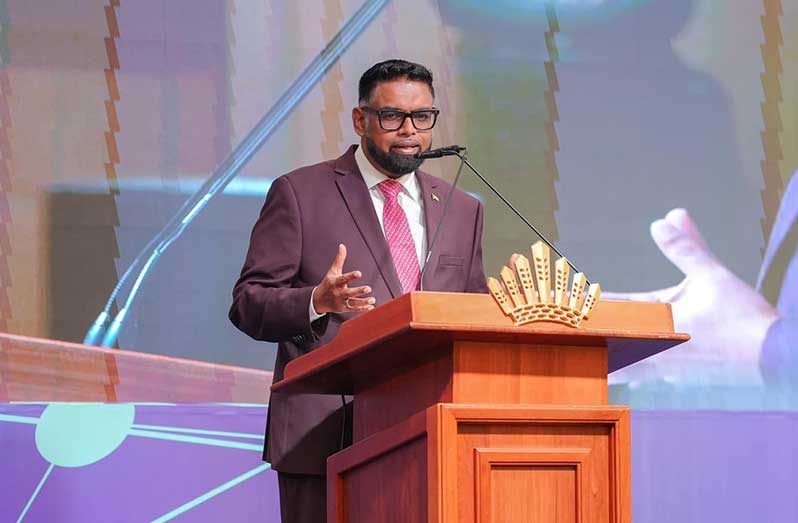EMPHASISING that every decision and investment made today must be adaptable to the rapidly digitalising world, President, Dr Irfaan Ali underscored the urgency of embracing artificial intelligence (AI) and digitisation.
The Head of State during his address at the opening ceremony of the Energy Conference And Supply Chain Expo on Tuesday, stressed that the future of energy and technology requires forward-thinking investments that align with the rapidly advancing digital world.
“Everything we invest in, everything we do now, must take into consideration that it has to be able, it has to be applicable and workable in a global environment in which digitisation and AI will be the order of the day,” he noted, stressing that failure to keep pace with these changes could prove detrimental to future competitiveness.
In Guyana’s case, the country has already outlined plans to digitise its healthcare system and has launched the Guyana Digital Initiative aimed at moulding tech experts. Aside from this, the government of Guyana will soon launch the first-of-its-kind digital school to serve the Caribbean region.-
These initiatives, the Guyanese leader explained, are all aimed at ensuring Guyana remains relevant and competitive on the global stage.
A HUB FOR DATA CENTRES
Meanwhile, at a panel discussion on Wednesday, Aly Orady, supercomputer engineer and founder of Tonal, emphasised the transformative impact of AI, noting its rapid progress and the need for new standards to measure its capabilities.
He highlighted AI’s applications in various sectors, such as healthcare, legal services, and engineering.
Orady explained that the global AI market is projected to grow from 387 billion to 1.3trillion.
“All of this usage of AI, all of this economic growth, has to be fuelled by data centres that consume energy,”
Closer to Guyana’s shores, Orady believes that the South American state can be a leader in AI and digitisation, leveraging its strategic advantages in energy.
With worldwide data centres projecting to rise from two per cent of overall power to 19 per cent by 2028, there will be a greater market for these facilities.
But how does Guyana fit into this discussion? Orady explained : “Because of how energy hungry these applications are, [it] is nearly a statement of fact to say that data centres will be built where power is cheapest and ideally co-located directly with generation. And I don’t need to point out that Guyana has a dramatic advantage when it comes to both of these points, the cost of energy and the ability to co-locate.”
“I call on us to seize this moment and build a future where Guyana is not just a participant, but a leader in the AI revolution,” he added.
AI AND SUSTAINABLE DEVELOPMENT
Meanwhile, Jay Persaud, EY Global Emerging Technology Ecosystem Leader, noted that Guyana is well positioned to establish a transformative roadmap investing in technology assets and infrastructure.
“Aligning technology and energy-development strategies will see tremendous returns for Guyana,” he said, noting that major companies are already using AI to improve experience and maintenance strategies.
“AI in the energy industry will create a demand for skilled employment in the technology sector.”
The country, he said, can build on its existing programmes such as the “ One Guyana Digital Initiative’ and the “Guyana Digital School’ to encourage domestic tech entrepreneurship and innovation.
He pointed out that the establishment of an AI data centre, or centres, along with digital skill training, will encourage innovation and entrepreneurship, establishing the country’s tech-sovereignty and secure assets for national and global use.
Back in December 2024, 365 students successfully completed the One Guyana Digital Programme, securing high-paying jobs in the tech industry.
This was after eight months of intensive training.
The initiative was first launched back in February 2024, in collaboration with the Toronto Metropolitan University, through a partnership between the Government of Guyana and Canada.



.jpg)










